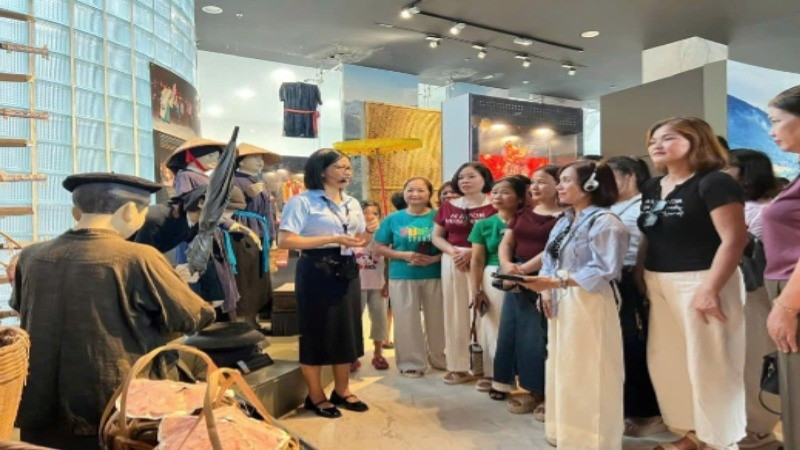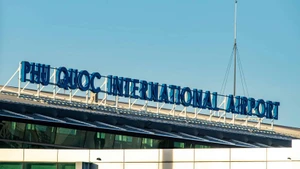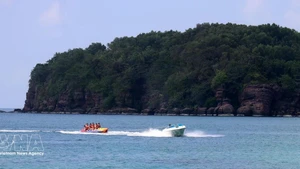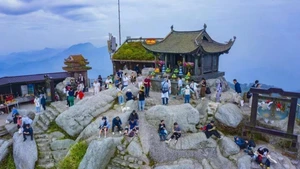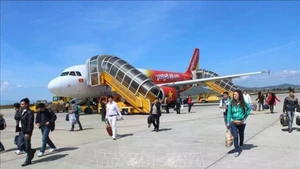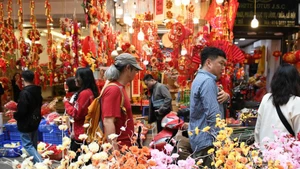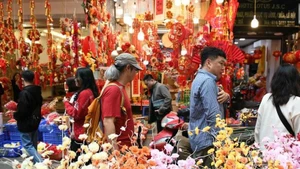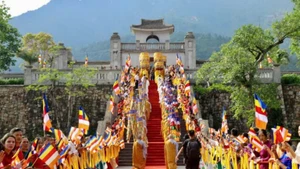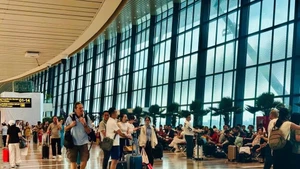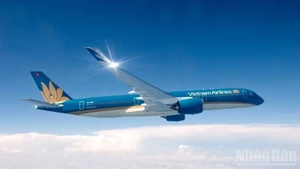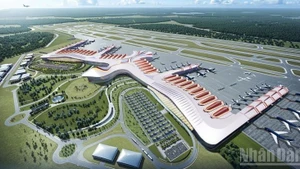Technology solutions such as Artificial Intelligence (AI), Internet of Things (IoT), big data, blockchain, virtual reality (VR) have helped visitors enhance their experiences and develop sustainable tourism.
In 2024, the number of domestic visitors reached about 110 million, about 17.5 million international visitors, an increase of nearly 39% compared to 2023 and total revenue reached about 850 trillion VND...
The effectiveness of digital transformation
As an overseas Vietnamese who has been away from home for many years, David Duc (British nationality) chose Quang Ninh Museum as the first destination on his tour.
He was surprised to see that everything from the exhibition space to the explanation form were applied digital technology. Previously, visitors had to buy paper tickets, but now they can buy tickets online and check tickets using the automatic door system after scanning the QR code.
The automatic explanation system (Audio Guide) supports visitors in English and Vietnamese. The easy-to-understand and easy-to-remember explanatory language, combined with codes corresponding to each exhibition area such as Yen Tu relic and Truc Lam Zen sect, underground coal mining... has helped visitors gain a deeper understanding of the history, culture and people of the mining land.
In addition, visitors can experience the 3D virtual reality museum at the website baotangao.baotangquangninh.vn; 360-degree digitalisation via cameras placed at relic sites and tourist attractions to simultaneously visit and explore impressive destinations such as Tra Co Communal House, Dong - Yen Tu Pagoda, Ha Long Bay...
In Da Nang, the locality has been at the forefront of digital transformation for many years, the applications “One touch to Da Nang” (VR360); Integrated 3D Scan technology; Electronic tourism information portal; Online travel fair have contributed to effectively promoting and promoting tourism.
Many visitors were impressed when witnessing the MARS robot named “Ms.Ariyana” brought in by Furama Resort Danang to support the organisation.
This robot has participated in many important events such as: Welcoming General Secretary To Lam on March 29, 2025, Danang Semiconductor Day in 2024; Super Viet Nam in 2025; AI Danang in 2025 and hundreds of other conferences. The appearance of the robot contributes to professionalising services and optimising human resources.
Ha Noi tourism has many diverse and rich types such as spirituality, craft villages, cultural and historical relics... With the support of the Viet Nam National Administration of Tourism, Ha Noi has deployed 13 points of application of the “Online-Connected-Multimodal” electronic ticket system at the Temple of Literature - Quoc Tu Giam; Viet Nam Fine Arts Museum, National History Museum...
According to statistics from the Viet Nam E-commerce Association (VECOM), the rate of domestic tourists booking hotels and tours online is over 60%; the rate of international tourists using these two services is over 75%.
Deputy Director of the Viet Nam National Administration of Tourism Pham Van Thuy said that digital transformation is gradually changing the face of Viet Nam’s tourism industry in a more professional, modern and effective direction, which is to create a digital ecosystem for the entire industry such as: Viet Nam tourism data system, tourism statistics reporting software, “Viet Nam Tourism – Viet Nam Travel” application...
Creating a fundamental mindset for the innovation process
In many localities such as Ha Noi, Khanh Hoa, Ho Chi Minh City..., destinations have been digitised, e-tickets have been applied, and cashless payments have been made.
Tourism businesses have begun to apply artificial intelligence (AI) and big data technology to business, market analysis and customer care. Energy-saving technology and the Internet of Things (IoT) are also applied in accommodation establishments.
According to Deputy Director of the Department of Culture, Sports and Tourism of Quang Ninh province Nguyen Lam Nguyen, the whole province has nearly 200/370 relics with QR codes so that visitors can scan and learn about culture and history.
Also through digital technology application platforms, the capital's tourism industry has built a communication strategy on digital platforms to promote the image of civilized, safe and friendly tourism.
Deputy Director of Ha Noi Department of Tourism Tran Trung Hieu said that along with other types of tourism such as night tourism associated with historical and cultural relics at Hoa Lo Prison, Thang Long Imperial Citadel, etc., medical tourism has also been invested in by the city with the “Ha Noi High-Tech and Digestive Center at Xanh Pon General Hospital”.
High-quality agricultural tourism products, eco-tourism, and resorts associated with new rural construction have attracted thousands of domestic and foreign visitors each year.
Tourism businesses, especially in the accommodation sector, have shifted strongly to digital platforms. Most hotels in Da Nang have applied platforms such as Agoda, Booking, Traveloka, etc. to help customers look up and book rooms quickly.
Some large hotels and international chains have also deployed digital systems such as chatbots integrated with Chat GPT, hotel information management systems and 360-degree travel experiences with smart technology applications in automatic check-in at the counter or via phone applications, quick check-in and check-out, and mobile applications for booking services, ordering food, and online feedback, etc.
Chairman of the Viet Nam Tourism Association Vu The Binh said that if the tourism industry does not keep up with the times, it will be difficult to compete in the context of an increasingly fierce global market.
Since 2018, when the Tourism Law took effect, the application of modern science and technology has been identified as a key orientation to serve the management and development of the tourism industry.
Many activities are organised in the spirit of innovation, typically international tourism fairs with themes related to the 4.0 Industrial Revolution. This is an important step to create a foundational mindset for the process of innovation in the tourism industry.
